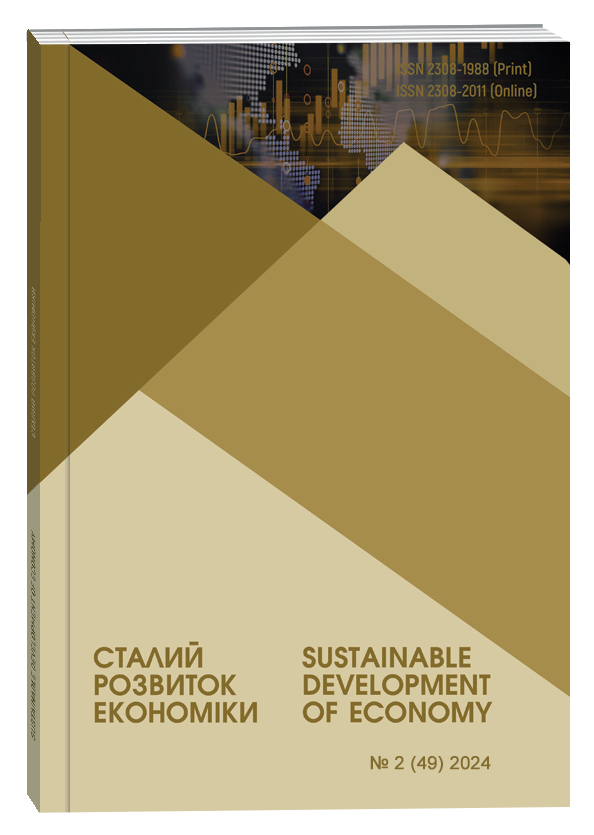PRINCIPLES AND PRACTICAL TOOLS OF PREVENTIVE CONTROL AND ANTI-CRISIS MANAGEMENT OF FOOD INDUSTRY ENTERPRISES IN THE MODERN BUSINESS ENVIRONMENT
Abstract
In the modern conditions of the business environment, the food industry is facing significant challenges, requiring effective preventive control and anti-crisis management from enterprises. This article is devoted to consideration of principles and practical tools that can be applied in the context of management of food industry enterprises in order to prevent crisis situations and ensure their sustainability in the modern business environment. Current trends in the food industry and identification of key factors affecting its sustainability are analyzed. Aspects such as global competition, changes in consumer preferences, regulatory policies and other factors that determine the dynamics of the industry are considered. The theoretical foundations of preventive control and anti-crisis management have been studied. Key concepts such as preventive control, crisis management, strategic planning and crisis response are discussed. The importance of preventive measures in preventing crises and maintaining the stability of enterprises in the food industry is highlighted. Specific practical tools and methods that can be used to implement preventive control and anti-crisis management at food industry enterprises are presented. Such aspects as development of crisis plans, risk analysis, management of financial resources and other tools are considered. The main goal of preventive management is to ensure the stability and efficiency of the enterprise in conditions of unpredictable changes in the internal and external environment. The considered aspects help the enterprise to effectively adapt to changes in the environment, prevent crisis situations and ensure stable development. The principles of effective management of crisis situations in the food industry are substantiated. Aspects such as communication with stakeholders, monitoring of market trends and rapid response to changes in the environment are discussed. Conclusions and recommendations regarding further directions of research in the field of preventive control and anti-crisis management of food industry enterprises are given. Potential obstacles and challenges that may arise in the process of implementing such strategies are discussed, as well as ways to overcome them.
References
Mertins L., & Jochem R. (Eds.). Information Management in the Industry 4.0 Era: Challenges and Opportunities. Springer, 2017.
Chen J.C., & Fill C. Marketing communications in tourism and hospitality: concepts, strategies and cases. Butterworth-Heinemann, 2006.
Modgil S., Choudhary A., & Dahiya K. Industry 4.0: The Future of Productivity and Growth in Manufacturing Industries. Springer, 2019.
Porter M.E. Competitive strategy: Techniques for analyzing industries and competitors. Simon and Schuster, 2008.
Kianto A., Sáenz J., & Aramburu N. Knowledge-based development in the era of the Fourth Industrial Revolution. Springer, 2017.
Simons R.. The role of management control systems in creating competitive advantage: New perspectives. Accounting, Organizations and Society. 1990. No. 15(1-2). P. 127–143.
Kane G.C., Palmer D., Phillips A.N., Kiron D., & Buckley N. Strategy, not technology, drives digital transformation: Becoming a digitally mature enterprise. MIT Sloan Management Review and Deloitte University Press, 2015.
Hevner A.R., March S.T., Park J., & Ram S. Design science in information systems research. MIS quarterly. 2004. No. 28(1). P. 75–105.
Chesbrough, H. Business model innovation: Opportunities and barriers. Long range planning. 2010. No. 43(2-3). P. 354–363.
Bajwa D.S., & Kumar P. Industry 4.0: From Smart Manufacturing to Smart Business. Springer, 2019.
Василенко В.О. Антикризове управління підприємством: навч. посібник. Київ : ЦУЛ, 2003. 504 с.
Лігоненко Л.О., Тарасюк М.В., Хіленко О.О. Антикризове управління підприємством: навч. посіб. Київ. нац. торг.-екон. ун-т, 2005. 377 с.
Чернявський А.Д. Антикризове управління підприємством: навч. посібник. Київ : МАУП, 2006. 256 с.
Шершньова З.Є., Оборська С.В. Антикризове управління підприємством: навч.-метод посібник для самост. вивч. дисц. Київ : КНЕУ, 2004. 196 с.
Штангрет А.М., Копилюк О.І. Антикризове управління підприємством: навч. посібник. Київ : Знання, 2007. 335 с.
Звіт про діяльність Ради з фінансової стабільності (серпень 2021 – липень 2022). URL: https://bank.gov.ua/ua/news/all/antikrizovi-zahodi-dlya-minimizatsiyi-rizikiv-dlya-ekonomiki-i-finansovogo-sektoru--u-fokusi-uvagi-radi-z-finansovoyi-stabilnosti-za-ostanniy-rik (дата звернення: 26.03.2023).
Mertins L., & Jochem R. (Eds.) (2017) Information Management in the Industry 4.0 Era: Challenges and Opportunities. Springer.
Chen J. C., & Fill C. (2006) Marketing communications in tourism and hospitality: concepts, strategies and cases. Butterworth-Heinemann.
Modgil S., Choudhary A., & Dahiya K. (2019) Industry 4.0: The Future of Productivity and Growth in Manufacturing Industries. Springer.
Porter M. E. (2008) Competitive strategy: Techniques for analyzing industries and competitors. Simon and Schuster.
Kianto A., Sáenz J., & Aramburu N. (2017) Knowledge-based development in the era of the Fourth Industrial Revolution. Springer.
Simons R. (1990) The role of management control systems in creating competitive advantage: New perspectives. Accounting, Organizations and Society, no. 15(1-2), pp. 127–143.
Kane G. C., Palmer D., Phillips A. N., Kiron D., & Buckley N. (2015) Strategy, not technology, drives digital transformation: Becoming a digitally mature enterprise. MIT Sloan Management Review and Deloitte University Press.
Hevner A. R., March S. T., Park J., & Ram S. (2004) Design science in information systems research. MIS quarterly, mo. 28(1), pp. 75–105.
Chesbrough H. (2010) Business model innovation: Opportunities and barriers. Long range planning, no. 43(2-3), pp. 354–363.
Bajwa D. S., & Kumar P. (2019) Industry 4.0: From Smart Manufacturing to Smart Business. Springer.
Vasylenko V. O. (2003) Antykryzove upravlinnia pidpryiemstvom: navch. posibnyk. Kyiv: TsUL, p. 504. (in Ukrainian)
Lihonenko L. O., Tarasiuk M. V., Khilenko O. O. (2005) Antykryzove upravlinnia pidpryiemstvom: navch. posib. Kyiv: Kyiv. nats. torh.-ekon. un-t, p. 377. (in Ukrainian)
Cherniavskyi A. D. (2006) Antykryzove upravlinnia pidpryiemstvom: navch. posibnyk. Kyiv: MAUP, p. 256. (in Ukrainian)
Shershnova Z. Ye., Oborska S. V. (2004) Antykryzove upravlinnia pidpryiemstvom: navch.-metod posibnyk dlia samost. vyvch. dysts. Kyiv: KNEU, p. 196. (in Ukrainian)
Shtanhret A. M., Kopyliuk O. I. (2007) Antykryzove upravlinnia pidpryiemstvom: navch. posibnyk. Kyiv: Znannia, p. 335. (in Ukrainian)
Zvit pro diialnist Rady z finansovoi stabilnosti (serpen 2021 – lypen 2022) [Report on the activities of the Financial Stability Council (August 2021 - July 2022)]. Available at: https://bank.gov.ua/ua/news/all/antikrizovi-zahodi-dlya-minimizatsiyi-rizikiv-dlya-ekonomiki-i-finansovogo-sektoru--u-fokusi-uvagi-radi-z-finansovoyi-stabilnosti-za-ostanniy-rik (in Ukrainian)


